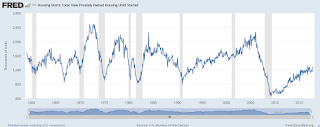Vital Statistics:
|
Last |
Change |
| S&P Futures |
2625.0 |
-3.3 |
| Eurostoxx Index |
384.5 |
-2.3 |
| Oil (WTI) |
56.9 |
-0.8 |
| US dollar index |
86.8 |
0.0 |
| 10 Year Govt Bond Yield |
2.32% |
|
| Current Coupon Fannie Mae TBA |
102.625 |
|
| Current Coupon Ginnie Mae TBA |
103.625 |
|
| 30 Year Fixed Rate Mortgage |
3.88 |
|
There is a slight risk-off feel to the market today as stocks are lower and bonds rally.
Mortgage Applications rose 5% last week as purchases rose 2% and refis rose 9%. The average 30 year fixed rate mortgage dropped a basis point to 4.19%.
The economy added 190,000 jobs last month
according to the ADP Employment Survey. The Street is looking for 204,000 jobs in this Friday's payroll report. This ADP number is more or less close to the average for the past year. Moody's Chief Economist Mark Zandi is
warning that the job market could overheat next year, as he sees the unemployment rate going below 4%. Will that cause the Fed to start hiking rates more aggressively? Perhaps, but until we start seeing broad-based wage inflation and begin to see it flow through to prices the Fed will probably be content to gradually normalize policy and not push the economy into a recession.
Productivity rose 3% in the third quarter, according to BLS, as output increased 4.1% and hours worked increased 1.1%. Generally speaking productivity increases drive wage increases, although that relationship has broken down somewhat over the past 15 years or so. Unit labor costs declined 0.2% as the increase in productivity offset the 2.7% increase in wages. At a recent
CEO roundtable, labor costs have taken over regulation as the top concern of Corporate America. Tax reform will probably encourage more capital investment to make workers more productive, and that should translate into wage inflation, although not necessarily into a larger number of workers.
As tax reform gets resolved, the next issue will be funding the government.
It won't take many conservatives to balk at funding the government to make Democrats necessary to keep the lights on. Democrats want some sort of immigration deal to go along with voting for a continuing resolution, which will be a non-starter for many Republicans. Don't forget the last time we had a government shutdown, you couldn't get 4506-Ts from the IRS, loan officers, plan accordingly.
Ray Dalio of Bridgewater
warns that tax reform will cause an exodus from high tax states like California, New York,
New Jersey, and Connecticut. Many big names in the hedge fund business have already relocated to Florida, where there are no state income taxes. Connecticut will be especially vulnerable, as it gets most of its revenue from one county. Meanwhile, NAR and Trulia
warn that tax reform will hit property values in these high tax states, and will exacerbate the inventory shortage as it will discourage sellers. As I have said before, it may affect the higher end of the market in these areas, but the sub $750,000 sector should be fine. If anything, it might encourage those that are thinking of buying a million dollar home to lower their price point, which would increase demand in that sector. As a general rule, the multi-million sector in the Northeast has been moribund to begin with, and the multi-million sector in the West has been driven by foreign money and stock market appreciation.
Affordable Housing Advocates are also
staunchly opposed to the new tax bill. Many for simple ideological reasons, however tax reform will affect the value of the tax write-offs that act as the incentive to build affordable housing. It will make affordable housing construction less attractive (and may turn it into a money-losing enterprise). Some groups claim that the home price appreciation has been so fast (especially in California) that it is creating a homelessness problem. A lack of affordable housing has been an issue for a long time, and tax reform certainly won't make it less of one.
The hurricanes accounted for 10% of the country's mortgage delinquencies. This is going to be a huge headache for lenders with servicing portfolios in Texas and Florida.
The emergence of fraud and swindles usually signals the top of bubbles. Liar loans and CDO squareds were the bell ringing at the top of the US residential real estate market. It looks like we are getting to see some of this in China as well,
which has a residential real estate market of epic proportions. When China's residential real estate bubble finally bursts, it will be a massive battle of wills between Mr. Market and Mr. Big Government. When Japan's bubble burst, the government used all sorts of ham-handed methods to prevent a crash, and I wouldn't be surprised to see China try some of the same things. Once China's bubble bursts, they will export deflation to the world, which will keep inflation in check in the US, however it will also sap global growth. Luckily Japan seems to be picking up at long last (almost 30 years).













